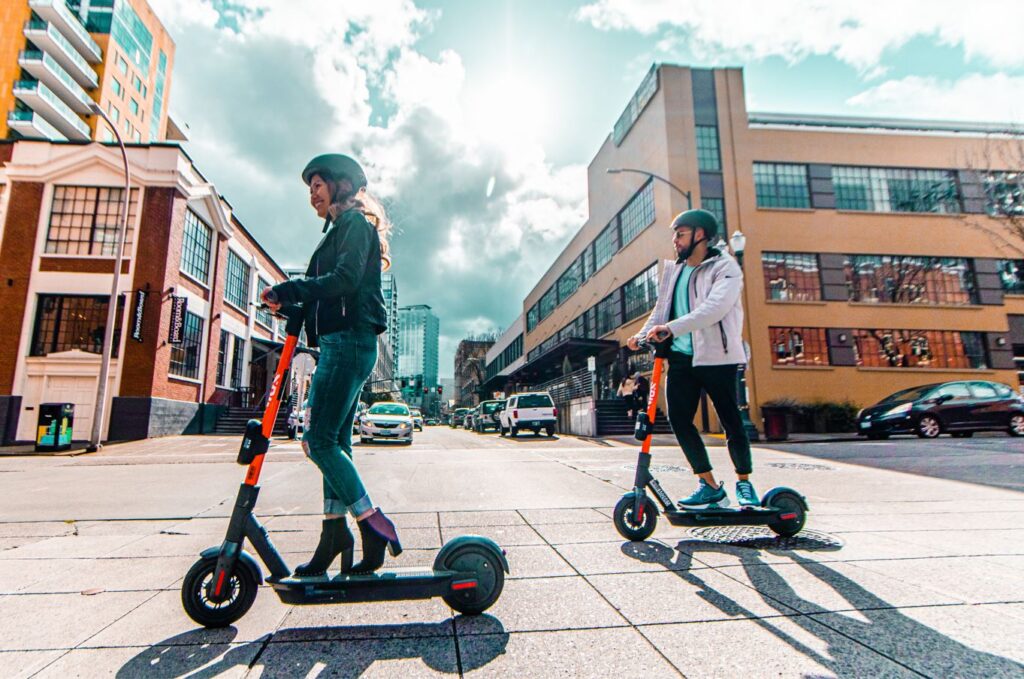Mode shifting our way to sustainable urban mobility

This is a guest blog post from our Gold Partner, Spin.
By Hui Wen Chan, Director of Sustainability, Spin
In August, the UN Intergovernmental Panel on Climate Change (IPCC) published its Sixth Assessment Report, which sounded a dire warning: changes to the climate are not only well underway, but are also widespread, rapid, and intensifying.
Spin’s mission of creating 15-minute cities isn’t simply about improving mobility in cities – it’s about contributing to a more sustainable and livable future. Personal mobility accounts for approximately 17 percent of our global carbon footprint, so sustainable transportation must be a part of the solution in cities. We’re proud that our electric scooters and bikes, powered by 100 percent renewable electricity, offer urban residents a convenient and green mode of transportation. In addition, Spin announced last month that through measuring, reducing, and offsetting our emissions, we are now a carbon neutral company. However, we know there is more that we must do to reduce emissions and combat a warming planet.
In honor of Climate Week, Spin jointly released a report with Marsh, a global leader in risk management, that looks at how the micromobility sector can further drive sustainability in cities and mitigate the risks from climate change through a combination of improved operational sustainability, enhanced product sustainability, and initiatives that enable and encourage mode shift away from cars for short trips.
From private car-dependency to a sustainable, multi-modal journey: mode shift and the 15-minute city
Providing a sustainable product and service alone is not sufficient to create the level of emissions reduction and positive change that we need to combat climate change. We must simultaneously encourage greater adoption of micromobility and other alternative modes like walking, cycling, and public transit, and enabling mode shift away from cars.
Since starting operations here in late 2018, Spin has delivered over 325,000 trips to Charlotte residents and visitors. With 29 percent of scooter trips replacing car trips and these trips averaging 1.73 miles, that’s over 154,000 scooter miles traveled that replaced car miles. When you do the math—the U.S. Environmental Protection Agency reports that the average car in the U.S. emits 404 grams of carbon dioxide per mile—we have helped Charlotte avoid emitting 66.3 metric tons of carbon dioxide over nearly three years of operations. This is equivalent to avoiding the emissions from consuming 7,463 gallons of gas.
Given 48 percent of car trips in the U.S. are less than three miles, a distance that can easily be covered by more sustainable micromobility solutions, there remains a huge opportunity to shift trips away from cars. Hence, the report also details the complementary activities that we believe must take place to further enable and encourage mode shift: 1) a focus on safety, including the infrastructure needed to promote safety, 2) equity, inclusion, and access to micromobility services, and 3) supportive policies and regulations that allow micromobility to flourish.
Spin has been tackling these issues through a number of initiatives, all with the goal of creating a world full of 15-minute cities, where people are able to travel between their homes and essential services and destinations within 15 minutes using active and sustainable mobility modes like walking, taking public transit, riding a scooter, or a bike.
Spin is enhancing safety through improving vehicle design, developing in-app safety features that educate riders, reinforce safety messaging, and incentivize safe riding behaviors, and partnerships with companies like Drover and Tortoise to incorporate technologies that enable safer riding.

We’re also working with cities and organizations to make the case for more people-oriented street design and safer infrastructure—like protected lanes and parklets—for micromobility and pedestrian use. That’s why we’re proud to support Charlotte’s Strategic Mobility Plan to help more people choose to walk, bike, scoot, and take public transit instead of using their personal cars.
We also have programs and partnerships that focus on providing micromobility services and transit access to neighborhoods currently underserved by transportation.
We deploy our e-scooters and e-bikes in equity zones to expand access to transit solutions and through Spin Access, provide discounted fares to those who qualify so they can access micromobility services regardless of their means.
We also work with cities and community organizations to engage and educate prospective riders to help us tackle the issue of mobility equity.
Lastly, our policy team engages with city agencies, policymakers, and regulators to encourage the development of supportive legislation and micromobility programs that enable micromobility companies to provide a safe, sustainable, and reliable service that meet the needs of their residents.
What’s next
As the UN IPCC report makes clear, we have no time to waste if we want to build a more sustainable future.
Greening our cities and their transportation systems is key to combating climate change. Enabling mode shift away from cars toward sustainable alternatives will require actions on numerous fronts.
Spin is committed to doing our part and continuing to enhance our sustainability as a company so that we can provide sustainable alternatives to cars for short trips. We will also continue to collaborate with cities, our community partners, our riders, and other stakeholders to push on all of these fronts so that we can realize our vision of a world of sustainable and livable 15-minute cities.
Find out more about our sustainability initiatives at www.spin.app/sustainability.
Hui leads Sustainability at Spin and spearheads cross-functional efforts to implement Spin’s Carbon Negative by 2025 Strategy. Previously, she led ESG strategy and reporting and climate risk management at Citi. She began her career in consulting and investment banking, and also has experience managing global health programs in the non-profit sector.
Thanks for reading!
As a nonprofit, community support is essential for us to keep doing what we do — including providing free articles like this. If you found this article helpful, please consider supporting Sustain Charlotte.
Want to stay in the loop? Subscribe to our weekly newsletter and follow us on Instagram, Facebook, and Twitter.
